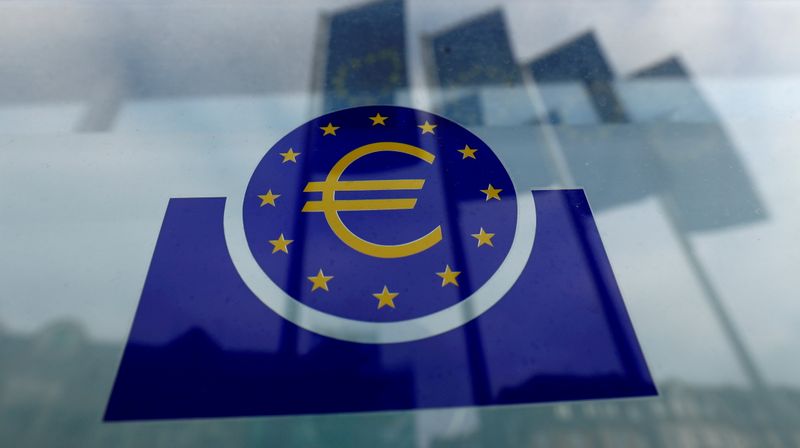By Balazs Koranyi and Francesco Canepa
FRANKFURT (Reuters) -The European Central Bank pledged on Thursday to keep interest rates at record lows for even longer to boost sluggish inflation and warned that the rapidly spreading Delta variant of the coronavirus poses a risk to the euro zone's recovery.
The central bank of the 19 countries that share the euro said it would not hike borrowing costs until it sees inflation reach its 2% target "well ahead of the end of its projection horizon and durably" -- a controversial decision that generated significant dissent.
"We did so to underline our commitment to maintain a persistently accommodative monetary policy stance to meet our inflation target," ECB President Christine Lagarde told a news conference.
She said the ECB wants to see inflation head to 2% by the mid-point of its forecast horizon, which currently stretches to 2023 and is extended by one year every December, and that any deviation above the target should be incidental.
The ECB's previous guidance said it would keep interest rates at current levels until it was happy that inflation expectations were converging to its target, and stop buying bonds for its quantitative easing programme shortly before that.
But a significant group within the 25-member Governing Council presented various objections to the wording and while Lagarde managed to win over most dissenters, Bundesbank chief Jens Weidmann and Belgian central bank governor Pierre Wunsch held out, four sources close to the discussion said.
"It was an unusually robust debate, and a lot more than just two people voiced concerns, but most were eventually won over by Lagarde," one of the sources said.
The shift in language was prompted by the ECB's new strategy, unveiled earlier this month, under which inflation may be allowed temporarily to exceed its target when "especially forceful or persistent" monetary support is needed.
Inflation has undershot the target for most of the last decade, even with rates slashed to record lows and stimulus pumped in.
"The new forward guidance is consistent with the ECB hiking rates even later than under the previous framework (but) it does not fundamentally change the criteria that will trigger policy normalisation," said Frederik Ducrozet, a strategist at Pictet..
Yet others felt the ECB was not going far enough.
"Unsurprisingly the ECB's grand new mandate interpretation looks worryingly like the old one with a pretty bow on it," said James Athey, investment director at Aberdeen Standard Investments.
The euro strengthened against the dollar after Lagarde's news conference while yields on euro zone government bonds fell.
William De Vijlder, chief economist at BNP-Paribas, said the currency's move showed the ECB is now perceived to be less accommodative than the U.S. Federal Reserve, which is targeting average realised inflation rather than focusing on expectations.
COMPROMISE
Governors from more indebted countries such as Portugal and Italy had come out in force before the meeting to argue that the new strategy means the ECB should keep the money taps wide open for even longer.
But inflation hawks, who favour tighter policy and tend to come from less indebted countries like Germany, have been more cautious as they expect price pressures to return sooner.
The ECB expects inflation in the euro zone as a whole to hit 1.9% this year before falling back to 1.5% in 2022 and 1.4% the year after.
Financial markets are not pricing in an interest rate hike for at least three years. The ECB last raised rates in July 2011.
COVID AND INFLATION
The ECB's inflation goal has slipped further from its grasp since the onset of the coronavirus pandemic, which Lagarde said remains a threat.
"The recovery in the euro area economy is on track," she said. "But the pandemic continues to cast a shadow, especially as the Delta variant constitutes a growing source of uncertainty."
The ECB has pledged to continue its 1.85 trillion euro ($2.18 trillion) Pandemic Emergency Purchase Programme (PEPP) until the "crisis phase" of the pandemic is over and at least until March 2022.
It will soon need to decide when to stop it and whether to replace it, at least in part, with other schemes.
Conservative policymakers argue that the COVID-19 emergency is fading so the ECB needs to give up its extraordinary powers and revert to more traditional measures, bound by stricter rules and with a narrower focus on getting inflation back to target.

But doves who back an easier policy stance have warned about the risk posed by the Delta variant, which has already caused containment measures to be partially reinstated in some euro zone countries.
($1 = 0.8481 euros)